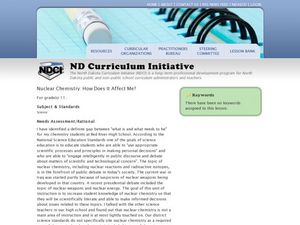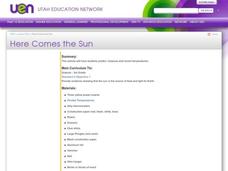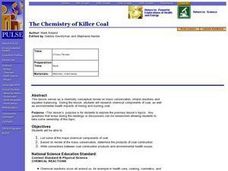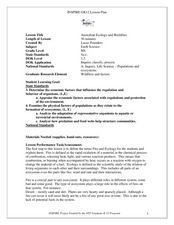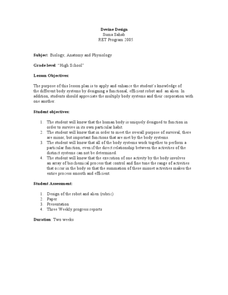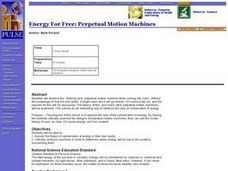Curated OER
Tackling Terror
Students discuss their fears of terrorism. In this terrorism lesson, students discuss the Madrid terror attacks, the history of terrorism, and share coping strategies.
Curated OER
Nuclear Chemistry: How Does It Affect Me?
Eleventh graders study the different areas of nuclear chemistry. In this energy and critical thinking lesson students study radiation, nuclear energy and weapons then divide into groups and create a poster.
Curated OER
Do Not Go Gentle into That Good Night Questions
In this reading comprehension worksheet, students respond to 5 short answer and essay questions based on the poem "Do Not Go Gentle into That Good Night."
Curated OER
Here Comes the Sun
Third graders watch a video on the solar system and examine the role of the sun. As a class, they complete a KWL chart and make different color temperature pockets to use during their experiment. In groups, they make predictions about...
Curated OER
Tracking Ozone
Learners track an ozone event in Groton, CT. They compare weather changes and the subsequent ozone levels. Also, they make comparisons and determinations about ozone levels.
Curated OER
The Chemistry of Killer Coal
Learners research chemical components of coal, as well as environmental health impacts of mining and burning coal. They discuss conservation of mass as it relates to combustion of organic compounds.
Curated OER
Titration Lab
Students determine the concentration of an unknown solution using titration. In this chemistry lesson, students explain the difference between acids and bases. They discuss the role of indicators in titration.
Curated OER
Exploring With Photograms
Students observe the interaction between energy absorbed, reflected or transmitted through an object in a photochemical process with a classroom demonstration.
Curated OER
Mechanical, Electrical and Radiant Energy
Pupils write a hypothesis and complete a lab. In this investigative lesson students complete their lab and a worksheet about energy.
Curated OER
Ozone Tag
Students explain the role of stratospheric ozone and predict at least three ways in which depleted ozone would change her/his lifestyle. They then
describe the process by which chlorine or bromine compounds can break down ozone molecules.
Curated OER
Sun Prints
Young scholars use coins to help them explore the sun as a source of renewable energy. They go outside in the sunshine and make a design by placing coins on their piece of black construction paper.
Curated OER
Urban Impact on Chollas Creek (California): A Field Study
Students, in groups, take samples from a creek and keep a field journal on their samples. They also perform tests on their samples.
Curated OER
Ground Level Ozone Testing
Students prepare Shoenbein Paper to test the ground level of ozone. They dip a strip of their test paper in distilled water and hang it at a data collection site. They determine the relative humidity of the data collection site. Using a...
Curated OER
Australian Ecology and Bushfires
Eighth graders discuss the different types of ecosystem. In this earth science lesson, 8th graders explain the benefits and harm of fire. They research articles about bush fires or controlled burn instance and share it with the class.
Curated OER
Effects of Ozone in the Air
Fifth graders learn how ground-level ozone is an air pollution problem. Students measure ozone levels and graph the results.
Curated OER
Where Has All the Water Gone?
Students identify how we use water everyday. They determine the amount of water used in different activities. They finally explain why the water supply is limited and how we can conserve water.
Curated OER
Linking Rembrandt and The Odyssey
Students apply knowledge of the style and techniques of Rembrandt to illustrate characters from The Odysey. They respond critically to a variety of works in the arts.
Curated OER
Oh Nuts! - Calories Count
Students measure and record the mass of the nut to be tested to the nearest 0.01 gram.
Curated OER
Learning Activities: What Color Am I?
Young scholars identify various species of anurans by their skin coloration. They describe how coloration contributes to survival.
Curated OER
Physical Difference and Classification
Students use a microscope and observation skills to compare and contrast several physical properties and develop a classification system.
Curated OER
Devine Design
Students examine the functions of the different systems in the body. They discover how different systems must work together to make the body function correctly. They identify the needs of the body to help it survive.
Curated OER
Density
Students work with a partner to record observations on various materials. Working together, they calculate the mass and volume of each material and then combine them and shake them for a period of time. In their journals, they record...
Curated OER
ESOL Safey and Security
Students study vocabulary words related to safety and warining signs. They write and practice saying the words. They view picture flash cards and attach different signs to the safety situations. They work in groups to create a...
Curated OER
Energy for Free: Perpetual Motion Machines
Young scholars observe the "drinking bird" perpetual motion machine and critically examine the designs of other so-called perpetual motion machines. They use this experience to create their own definition of conservation of energy.



